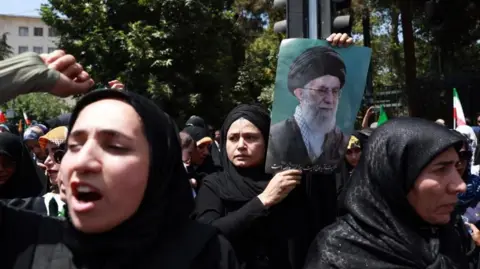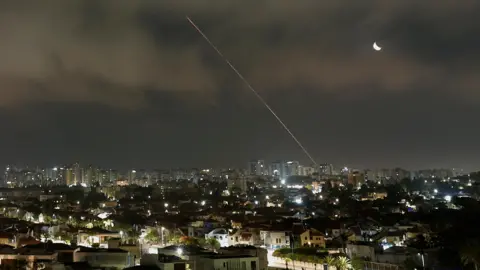Iran rules out new nuclear talks until attacks stop
 EPA
EPAIran has said it will not resume talks over its nuclear programme while under attack, hours after Israel's defence minister warned of a "prolonged" conflict with the Islamic Republic.
Foreign Minister Abbas Araghchi on Friday met European diplomats in Geneva who urged him to revive diplomatic efforts with the US over his country's nuclear programme.
The Israeli army's chief of staff Eyal Zamir said in a video address that his country should be ready for a "prolonged campaign".
Fighting has raged into the night with the Israeli military announcing a new wave of attacks against Iranian missile storage and launch sites after Iran launched missiles towards central Israel.
Explosions were heard close to Tel Aviv, with missile interceptions visible over Israel's second-largest city. Reports say a building was set on fire in central Israel by falling shrapnel.
Meanwhile, a 16-year-old was killed and two others were injured in a Israeli strike on the city of Qom, south of Tehran, Iranian state media reported early on Saturday.
They reported Israeli strikes also again targeted a nuclear facility in the city of Isfahan.
On Friday, Araghchi said Iran was ready to consider diplomacy only once Israel's "aggression is stopped".
Iran's nuclear programme was peaceful, he insisted, and Israel's attacks violated international law. Iran, he added, would continue to "exercise its legitimate right of self-defence".
"I make it crystal clear that Iran's defence capabilities are non-negotiable," he said.
Araghchi is set to attend another round of talks on Saturday, in Istanbul, with representatives of the Arab League over the weekend.
Israel's ambassador to the UN accused Iran of having a "genocidal agenda" and posing an ongoing threat, adding that Israel would not stop targeting nuclear facilities until they were "dismantled".
In an interview with German newspaper Bild published on Saturday, Israeli Foreign Minister Gideon Sa'ar said his country had set back Iran's nuclear capabilities by at least two years.
He added that strikes would continue.
 Reuters
ReutersUS President Donald Trump said Iran had a "maximum" of two weeks to avoid possible American air strikes, suggesting that he could take a decision before the 14-day deadline he set on Thursday.
"I'm giving them a period of time, and I would say two weeks would be the maximum," Trump told reporters.
The aim, he said, was to "see whether or not people come to their senses".
The US president was also dismissive of the Geneva talks between Araghchi and foreign ministers from the UK, France, Germany and the EU.
"Iran doesn't want to speak to Europe," Trump said. "They want to speak to us. Europe is not going to be able to help in this."
UK Foreign Secretary David Lammy said that the US had provided a "short window of time" to resolve the crisis in the Middle East which was "perilous and deadly serious".
French Foreign Minister Jean-Noel Barrot said the ministers had invited the Iranian minister to "consider negotiations with all sides, including the United States, without awaiting the cessation of strikes".
Barrot added that there could be "no definitive solution through military means to the Iran nuclear problem" and warned that it was "dangerous to want to impose a regime change" in Iran.
Israel was also hit by a new round of Iranian strikes on Friday with the Israeli military reporting an attack of 20 missiles targeting Haifa.
One Israeli woman died of a heart attack, bringing the Israeli death toll since the conflict began to 25.
The Israel Defense Forces said they had attacked ballistic missile storage and launch sites in western Iran.
Over the past week, Israeli air strikes have destroyed Iranian military facilities and weapons, and killed senior military commanders and nuclear scientists.
Iran's health ministry said on Sunday that at least 224 people had been killed, while a human rights group, the Human Rights Activists News Agency, put the unofficial death toll at 657 on Friday.
Israel launched strikes in Iran on 13 June, leading to several rounds of Iranian missile and drone attacks on Israel.
